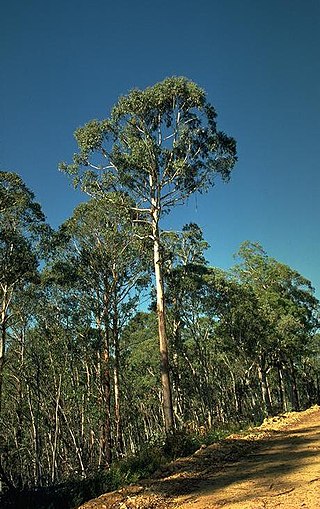
Eucalyptus delegatensis, commonly known as alpine ash, gum-topped stringybark, white-top and in Victoria as woollybutt, is a species of tree that is endemic to southeastern Australia. It has a straight trunk with rough, fibrous to stringy bark on the lower half of the trunk, smooth white bark above, lance-shaped to curved adult leaves, flower buds in groups of between seven and fifteen, white flowers and barrel-shaped or hemispherical fruit.

Eucalyptus melliodora, commonly known as yellow box, honey box or yellow ironbark, is a species of medium-sized to occasionally tall tree that is endemic to south-eastern, continental Australia. It has rough, flaky or fibrous bark on part or all of the trunk, smooth greyish to yellowish bark above. The adult leaves are lance-shaped to egg-shaped, the flower buds are arranged in groups of seven and the fruit is more or less hemispherical.
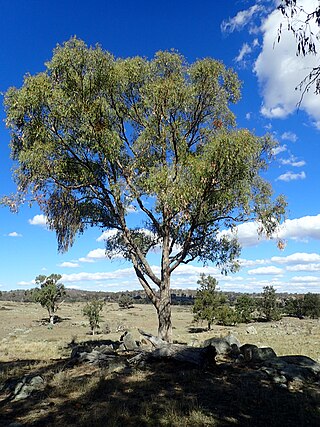
Eucalyptus nova-anglica, commonly known as the New England peppermint or black peppermint, is a species of small to medium-sized tree endemic to eastern Australia. It has thick, rough, fibrous bark on the trunk and larger branches, lance-shaped adult leaves, flower buds in groups of seven, white flowers and hemispherical or conical fruit.

Eucalyptus moluccana, commonly known as the grey box, gum-topped box or terriyergro, is a medium-sized to tall tree with rough bark on part or all of the trunk, smooth bark above, lance-shaped adult leaves, flower buds usually in groups of seven, white flowers and cup-shaped to barrel-shaped fruit. It is found in near-coastal areas of Queensland and New South Wales.
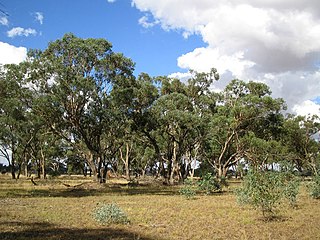
Eucalyptus microcarpa, commonly known as grey box, is a species of tree that is endemic to southeastern continental Australia. It has rough, fibrous or flaky bark on the trunk, smooth whitish bark above, lance-shaped adult leaves, flower buds in groups of between seven and eleven, white flowers and oval, cylindrical or urn-shaped fruit.

Eucalyptus smithii, commonly known as the gully gum, gully peppermint, blackbutt peppermint, or ironbark peppermint, is a species of medium-sized to tall tree, sometimes a mallee, that is endemic to southeastern Australia. It has rough, compact bark on the trunk, smooth ribbony bark above, narrow lance-shaped adult leaves, flower buds in groups of seven, white flowers and cup-shaped, bell-shaped or hemispherical fruit.

Eucalyptus viridis, commonly known as the green mallee, is a species of mallee or small tree that is endemic to south-eastern, continental Australia. It has rough fibrous or flaky bark on the lower trunk, smooth bark above, linear to narrow lance-shaped adult leaves, flower buds in groups of seven or nine, white flowers and cup-shaped fruit.
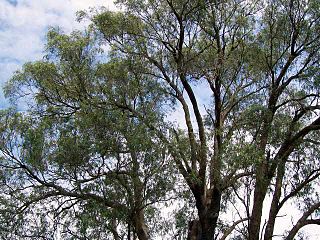
Eucalyptus macarthurii, commonly known as the Camden woollybutt or Paddy's river box, is a species of medium-sized tree that is endemic to a small area of New South Wales. It has rough, fibrous bark on the trunk and larger branches, smooth above, narrow lance-shaped to curved adult leaves, flower buds in groups of seven, white flowers and small conical to bell-shaped fruit.
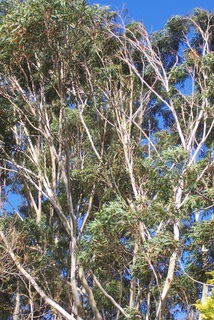
Eucalyptus pilularis, commonly known as blackbutt, is a species of medium-sized to tall tree that is endemic to eastern Australia. It has rough, finely fibrous greyish bark on the lower half of the trunk, smooth white, grey or cream-coloured bark above, lance-shaped to curved adult leaves, flower buds in groups of between seven and fifteen, white flowers and hemispherical or shortened spherical fruit.
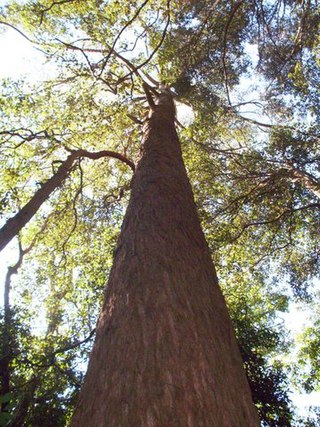
Eucalyptus fastigata, commonly known as brown barrel or cut-tail, is a species of medium-sized to tall tree that is endemic to southeastern Australia. It has fibrous or stringy bark on the trunk and larger branches, smooth bark above, lance-shaped to curved adult leaves, flower buds in groups of eleven or more, white flowers and conical or pair-shaped fruit.

Eucalyptus conica, commonly known as fuzzy box, is a species of tree endemic to eastern Australia. It has rough, flaky bark on the trunk and larger branches, smooth above, lance-shaped adult leaves, oval to diamond-shaped flower buds mostly arranged on a branching inflorescence on the ends of the branchlets, white flowers and conical fruit.

Eucalyptus laevopinea, commonly known as the silver top stringybark, is a tree that is endemic to eastern Australia. It has rough, stringy greyish bark on the trunk and larger branches, glossy green, lance-shaped adult leaves, flower buds in groups of between seven and eleven, white flowers and hemispherical or shortened spherical fruit.

Eucalyptus bridgesiana, commonly known as apple box, apple, apple gum or but-but, is a medium to large sized tree. It has rough, fibrous bark on the trunk and larger branches, smooth grey bark above, glossy green, lance-shaped adult leaves, flower buds in groups of seven, white flowers and hemispherical fruit.

Eucalyptus consideniana, commonly known as yertchuk, is a species of plant in the myrtle family and is endemic to south-eastern Australia. It is a tree with rough, fibrous, sometimes prickly bark on the trunk and larger branches, smooth grey bark above, lance-shaped or curved adult leaves, flower buds in groups of between eleven and nineteen, white flowers and conical to hemispherical fruit.

Eucalyptus dunnii, commonly known as Dunn's white gum or simply white gum, is a species of medium-sized to tall tree that is endemic to eastern Australia. It has rough bark near the base, smooth white to cream-coloured bark above, lance-shaped to curved adult leaves, flower buds in groups of seven, white flowers and cup-shaped, conical or hemispherical fruit.

Eucalyptus intertexta, commonly known as inland red box, western red box, gum coolibah or the bastard coolibah, is a species of tree that is endemic to central Australia. It has rough, fibrous or flaky bark on the base of the trunk, smooth white to brownish bark above, lance-shaped adult leaves, flower buds in groups of seven on the ends of branchlets, white flowers and cup-shaped to hemispherical fruit.
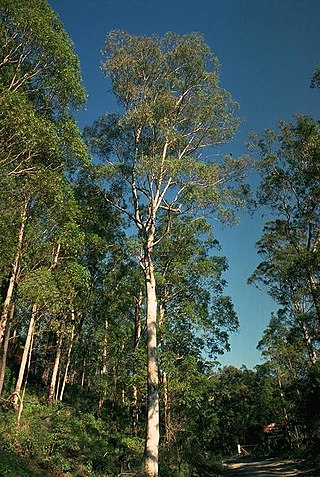
Eucalyptus largeana, commonly known as the Craven grey box, is a species of medium-sized to tall tree that is endemic to a restricted area of New South Wales. It has rough, fibrous or flaky bark on the trunk and larger branches, smooth greyish bark above, lance-shaped adult leaves, flower buds in groups of seven, white flowers and cup-shaped or barrel-shaped fruit.

Eucalyptus morrisii, commonly known as grey mallee, is a species of mallee or straggly tree that is endemic to western New South Wales. It has rough, fibrous or flaky bark on some or all of the trunk, smooth greyish bark above, lance-shaped adult leaves, flower buds usually in groups of three, white flowers and conical or hemispherical fruit.

Eucalyptus rudderi, or Rudder's box, is a species of tree that is endemic to northern New South Wales. It has rough fibrous or flaky bark on the trunk and branches, lance-shaped adult leaves, flower buds in groups of seven, white flowers and barrel-shaped or hemispherical fruit.

Eucalyptus tetrodonta, commonly known as Darwin stringybark or messmate, is a species of medium-sized to tall tree that is endemic to northern Australia. It has rough, stringy or fibrous bark on the trunk and branches, lance-shaped leaves arranged in opposite pairs, flowers buds in groups of three, whitish to cream-coloured flowers and cylindrical fruit.





















